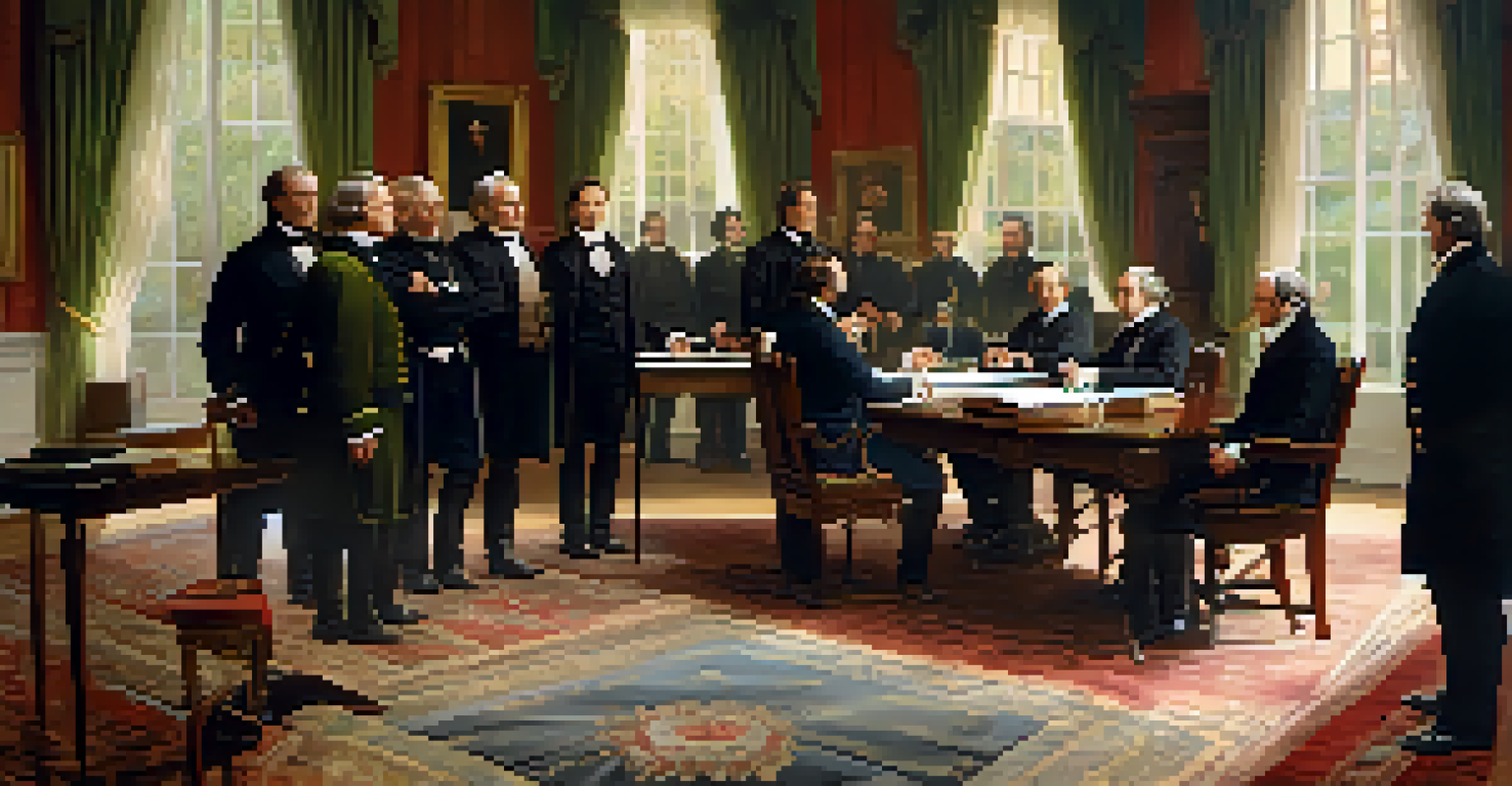James K. Polk: The Charlotte Native Who Became President

Early Life: Roots in Charlotte, North Carolina
James K. Polk was born on November 2, 1795, in a modest home in Charlotte, North Carolina. Growing up in a family of modest means, he learned the values of hard work and perseverance. His father, a successful planter, instilled in him the importance of education, leading Polk to pursue his studies diligently. This strong foundation would later serve him well as he navigated the political landscape of America.
The greatest presidency is not about the number of decisions you make, but the impact those decisions have on the future.
As a child, Polk faced significant health challenges, including a serious illness that left him with lifelong complications. Despite these struggles, he demonstrated resilience and an unwavering commitment to his education. At the young age of 17, he enrolled at the University of North Carolina, where he honed his skills in rhetoric and debate, setting the stage for his future political career.
Polk's experiences in Charlotte shaped his worldview and deepened his understanding of the complexities of American life. The early influences of his family, education, and community played a crucial role in molding his character and ambitions. Little did he know, these formative years would propel him toward a future as one of America's most significant presidents.
Political Beginnings: A Rising Star
Polk's political journey began when he was elected to the Tennessee House of Representatives in 1823. His passion for politics was ignited during his university years, where he became involved in debates and political discussions. With a natural ability to connect with people, he quickly gained recognition for his commitment to public service. This initial foray into politics opened doors for future opportunities.

In 1825, Polk was elected to the U.S. House of Representatives, where he served for 14 years. During his time in Congress, he became known for his strong advocacy for issues like westward expansion and economic growth. His dedication to these causes earned him a reputation as a staunch supporter of the Democratic Party and its principles, particularly those of President Andrew Jackson.
Polk's Formative Early Life
James K. Polk's upbringing in Charlotte, North Carolina, instilled in him the values of hard work and resilience, shaping his future political ambitions.
As he climbed the political ladder, Polk's determination and strategic thinking set him apart from his peers. His ability to build alliances and navigate the complexities of political maneuvering made him a formidable figure. By the time he sought the presidency, he had already established himself as a key player in American politics, ready to take on the challenges ahead.
The Road to the Presidency: 1844 Campaign
In 1844, James K. Polk announced his candidacy for the presidency, capitalizing on the growing desire for territorial expansion. His platform focused on issues like Manifest Destiny, the belief that Americans were destined to expand across the continent. This resonated with voters eager for growth and opportunity, setting the stage for a heated campaign.
Expansion is the key to prosperity; it is the lifeblood of our nation’s growth.
Polk faced off against prominent candidates, including Henry Clay, who had substantial support. However, Polk's ability to connect with the electorate and articulate his vision for America's future gave him an edge. His campaign strategy emphasized the need for decisive leadership and a commitment to expanding the nation's borders, effectively capturing the public's imagination.
Ultimately, Polk's campaign was successful, and he emerged victorious in the 1844 election. His win marked a significant shift in American politics, as he represented a new wave of leaders focused on expansion and progress. This pivotal moment in his career set the tone for his presidency and the nation's trajectory in the years to come.
Presidency: A Visionary Leader
James K. Polk took office on March 4, 1845, with a bold vision for America. His presidency was characterized by an aggressive foreign policy and a commitment to territorial expansion. Polk famously stated that he would achieve four main goals during his term: acquiring California, settling the Oregon border, reducing tariffs, and establishing an independent treasury. This ambitious agenda demonstrated his determination to transform the nation.
One of Polk's most significant accomplishments was the successful negotiation of the Oregon Treaty in 1846, which settled the dispute with Britain over the Oregon Territory. This achievement not only fulfilled a key campaign promise but also solidified Polk's reputation as a capable leader. Shortly after, he led the nation into the Mexican-American War, another crucial step in fulfilling his expansionist dreams.
Territorial Expansion Vision
As president, Polk aggressively pursued territorial expansion, successfully negotiating the Oregon Treaty and leading the nation into the Mexican-American War.
Polk's presidency was marked by rapid territorial gains, including the acquisition of California and much of the Southwest through the Treaty of Guadalupe Hidalgo. These achievements reshaped the United States and set the stage for its emergence as a continental power. Yet, this aggressive expansion also laid the groundwork for future conflicts over slavery and states' rights, issues that would haunt the nation for years to come.
Challenges and Controversies: A Divided Nation
While Polk is often celebrated for his achievements, his presidency was not without challenges and controversies. The Mexican-American War, while successful for the U.S., sparked intense debates about the morality and consequences of expansion. Critics accused Polk of overstepping, arguing that he provoked the war for personal and political gain, which left a lasting scar on his legacy.
Additionally, the rapid expansion of territory raised significant questions about slavery and its spread into new states. As new territories were acquired, the debate over whether they should be free or slave states intensified, contributing to the growing divisions within the country. This polarization foreshadowed the tumultuous years leading up to the Civil War.
Polk's administration faced criticism from both sides of the political spectrum, as he navigated the complexities of a nation on the brink of division. Despite these challenges, he remained resolute in his vision and goals. His presidency serves as a reminder of the delicate balance between ambition and the consequences of leadership in a rapidly changing landscape.
Legacy: The Impact of Polk's Presidency
James K. Polk left office on March 4, 1849, after serving a single term, but his impact on the nation was profound. He achieved nearly all of his ambitious goals, significantly expanding the United States and shaping its future. His commitment to Manifest Destiny resonated with many Americans, but it also raised ethical questions that continue to be debated today.
Polk's presidency is often viewed through the lens of its successes in territorial expansion, yet it also serves as a cautionary tale about the complexities of leadership. While he fulfilled his promises, the consequences of his actions led to significant national strife, particularly regarding the issue of slavery. This legacy of conflict would haunt the nation for decades to come.
Legacy of Conflict and Achievement
While Polk achieved significant territorial gains, his presidency also ignited debates over slavery and national division that would haunt the nation for years.
Today, historians often reflect on Polk's dual legacy: a visionary leader who expanded the nation and a controversial figure whose actions contributed to deep divisions. His life story, from humble beginnings in Charlotte to the highest office in the land, illustrates the complexities of American history and the enduring impact of leadership decisions.
Conclusion: Remembering James K. Polk
James K. Polk's journey from Charlotte to the presidency is a remarkable story of ambition, determination, and complexity. His presidency marked a pivotal point in American history, characterized by significant territorial expansion and deepening national divisions. As we reflect on his legacy, we recognize the intricate interplay between vision and consequence in leadership.
Polk's commitment to his ideals propelled the nation forward, but also left a legacy of conflict that resonates to this day. His life serves as a reminder of the challenges faced by leaders and the far-reaching impacts of their decisions. Understanding Polk's story helps us appreciate the complexities of our nation's history and the lessons it imparts.

As we remember James K. Polk, we honor not just his achievements, but also the nuanced reality of his presidency. His story is woven into the fabric of American life, reminding us that the pursuit of progress often comes with difficult choices and lasting implications. In the end, Polk remains a significant figure in our understanding of the American narrative.